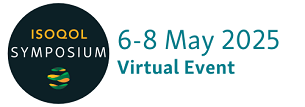Angela Wolff, PhD RN, and Elizabeth Austin, PhD MPH
1st Virtual Symposium Co-Chairs
We are excited and proud to host the upcoming ISOQOL’s first virtual symposium, which focuses on the challenges healthcare providers (HCPs) encounter when integrating patient-reported outcome measures (PROMs) into routine practice. The symposium will be held over three half-days from 6-8 May 2025 on the ISOQOL e-learning platform. We have a stimulating program made up of seven interactive sessions where we will identify these challenges that might be unknown, overlooked, or overseen and hear about real-world examples to provide guidance to address them.
On day one, we kick off the symposium as co-chairs and provide an overview of what it means to implement PROMs in clinical practice. HCPs can face barriers when trying to use PROMs across various clinical settings, and implementing PROMs requires engaging providers. At the same time, there are things that can be leveraged to facilitate implementation. In Session 1, we will introduce Implementation Science frameworks that can influence uptake, as well as frame the remaining sessions.
In Session 2, Dr. Angela Wolff will dive deeper into the Theoretical Domains Framework (TDF) and Capability, Opportunity, Motivation and Behavior (COM-B) model to understand barriers and facilitators to change HCP behavior. Dr. Julia Moore will lead an interactive activity where attendees will prioritize the factors that matter most to their context to increase provider adoption of PROMs. The focus of the session will be on ”who” needs to change ”what” when introducing or sustaining PROMs in clinical settings.
Day two of the symposium will begin with exploring how knowledge, skills, and clinical decision-making (capabilities) needed for using PROMs in clinical practice can vary for HCPs from various professional backgrounds and in different clinical settings. We will hear from Dr. Wolff and Dr. Liv Marit Valen Schougaard in this session, focusing on the capabilities of HCPs and the need to know what PROMs are and how to use them in their routines.
Local environment plays a large role in HCPs’ adoption of PROMs. Environmental factors like organizational operations and physical, technological, and people resources can impede or assist HCPs’ opportunities for utilizing PROMs. In Session 4, Dr. Elizabeth Austin, Dr. Lotte Haverman, and Selina Limmen will share how such barriers can be redirected to become support via thoughtful implementation design.
Session 5 will focus on HCPs’ motivation for adopting PROMs in clinical practice and the role attitudes and beliefs play in facilitating that change. Dr. Austin, Dr. Natasha Roberts, Dr. Lisa Edwards, and Dr. Patricia Franklin will share practice examples to show the importance of assessing these HCP attitudes and beliefs throughout implementation.
On the final day of the symposium, we will explore how measuring and collecting patient-reported outcomes may increase health disparities if not implemented equitably. Dr. Austin, Dr. Richard Sawatzky, and Dr. Angela Stover will discuss how HCPs can ensure more equitable care for all patients by accounting for these individual differences to better understand and address health inequities.
Finally, in the last session of the symposium, Dr. Wolff will help participants translate known factors that matter most into actionable implementation strategies and discuss evaluation. Dr. Julia Moore will demonstrate how implementation strategies should align with the factors influencing HCP adoption of PROMs in the local setting. To follow, Anouk Groenewegen will showcase tailored strategies and evaluation methods used to change HCP behavior.
We would like to take a moment to thank all the speakers for their time and dedication to making this symposium possible.
It is our goal for this symposium to be truly engaging for participants, and there are more connection opportunities than ever before. Attendees will be able to discuss and interact with speakers, participate in an interactive online activity to share input, ask questions and have them answered live, and network with fellow attendees in the chat. We invite you to join us live to engage! In the event you are not able to attend, the symposium will be available on-demand following the live event.
Registration is open now through 5 May 2025. We hope to see you there!
This newsletter editorial represents the views of the author and does not necessarily reflect the views of ISOQOL.
How to Submit a Newsletter Editorial
Do you have something to share about health related quality of life and patient-centered outcomes? We want to hear from you!
Learn More

The International Society for Quality of Life Research (ISOQOL) is a global community of researchers, clinicians, health care professionals, industry professionals, consultants, and patient research partners advancing health related quality of life research (HRQL).
Together, we are creating a future in which patient perspective is integral to health research, care and policy.

